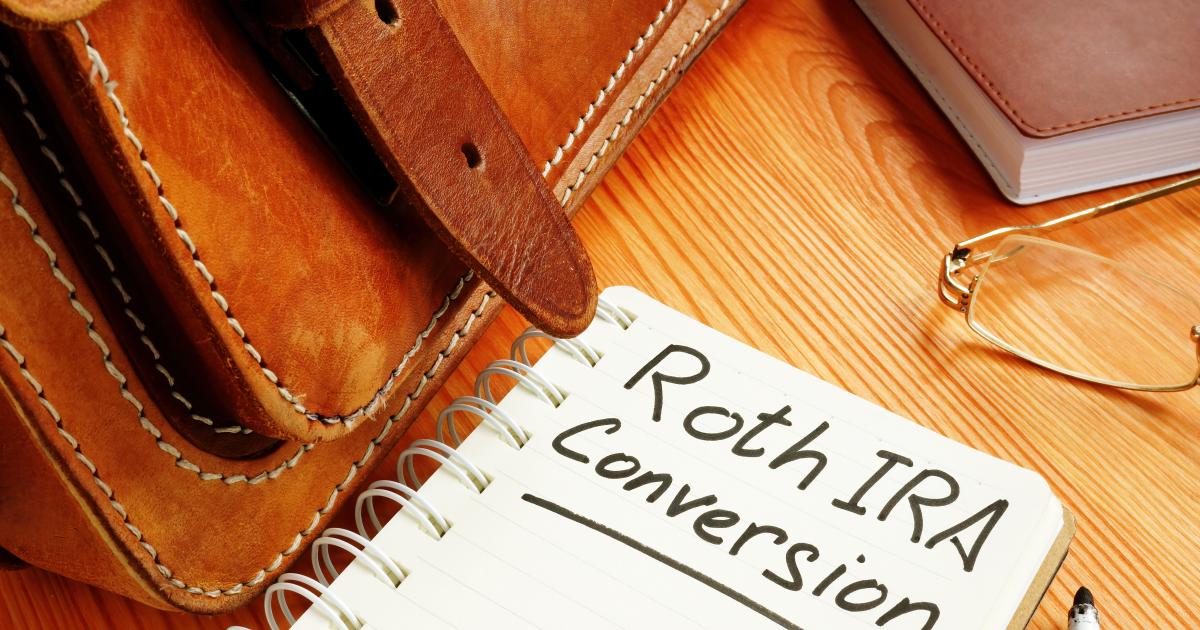[ad_1]
When you know you’re going to buy an expensive new kitchen appliance, you’re probably willing to wait until that item goes on sale. When it comes to big investment decisions, you can do the same to make sure you get the best deal. With the stock market continuing to trend down and recession a real possibility, it may be time to think of a Roth IRA conversion as an “on sale” opportunity.
A Roth IRA or Roth 401(k) is a type of retirement account. Although it offers no current-year tax benefits, earnings grow tax-free, and you can withdraw them tax- and penalty-free after age 59½ and once the account has been open for five years.
U.S. tax regulations are set up to give savers a tax break in the hope of getting them to prepare for retirement. Traditional retirement accounts let working people save on taxes the year they contribute; in Roth retirement accounts, the tax savings come later. Roth accounts have the added benefit of allowing gains or interest earned in the Roth IRA or 401(k) to escape taxation completely. Here are two examples:
- You contribute $10,000 of pre-tax earnings to a Traditional 401(k) at your work in 2000 when you are 55. That year, you reduce your taxable income by $10,000 that year. Over the next 20 years, your investments take the balance to $25,000. In 2022, at age 77, you withdraw that $25,000. For your 2022 taxes, you add $25,000 to your taxable income. Your initial, pre-tax deposit plus all the earnings become taxable income.
- You contribute $10,000 of post-tax earnings to a Roth 401(k) at your work in 2000 when you are 55. That contribution has no effect on your taxable earnings for 2000. Over the next 20 years, your investments take the balance to $25,000. In 2022, at age 77, you withdraw that $25,000. For your 2022 taxes, you add none of that $25,000 to your taxable income. You already paid taxes on the initial $10,000 in 2000. And you’ll never have to pay taxes on the $15,000 your account earned. That’s an exciting and rare deal because very little other income escapes taxation in the U.S.
Taxpayers are allowed to convert Traditional retirement accounts to Roth IRA accounts with few limitations. If you contributed to a Traditional retirement account over your working life, you might wonder if it’s time to convert your Traditional retirement account to a Roth account.
Pros and Cons of a Roth Conversion
Pros:
Cons:
- Potential to bump up your adjusted gross income
- Need to have cash available to pay tax bill
Pay the Piper Today; Benefit Tomorrow
Roth conversions are popular because you can potentially reduce the total tax you’ll pay on your retirement investments over time. Also, unlike Traditional retirement accounts, Roth accounts have no RMDs during the owner’s lifetime. You’ll want to do a cost-benefit analysis — or work with a fee-only fiduciary financial advisor — to see when you’d break even on a Roth conversion.
A Bear Market Saves Conversion Costs
Converting to a Roth when stock prices are lower could also mean owing less tax at the time you convert. Here’s an example. Imagine that in 2021, your Traditional 401(k) balance invested in a target date exchange-traded fund (ETF) was $250,000. In summer 2022, after the stock market dropped about 30%, your balance is more like $175,000.
Had you done a Roth conversion back in 2021, you would have added $250,000 to your 2021 taxable income, potentially owing as much as 35% of that amount or about $87,500 in additional taxes.
If you do the Roth conversion, in this example, you’ll only add $175,000 to your 2022 taxes, which could reduce that sample tax burden to $56,000, in part because you’re adding less to your taxable income and you’d be in a lower tax bracket.
If you can afford to pay those taxes, converting to a Roth may be a smart strategy.
A Big-Picture Outlook Could Save You Money
If you’ve been waiting for the right time to convert to a Roth, now may be it. Consider the strategy and its impact on your other finances. If you want an expert to weigh in, it’s important to collaborate with a financial advisor who specializes in tax-focused Roth strategies.
Wealthramp vets advisors and planners and encourages one-on-one consultations with advisors you’re matched with. Financial advice should be unbiased, which means the advisor (or planner) you seek out is fee-only and legally held to the fiduciary standard versus a commissioned sales rep from a brokerage firm or insurance company.
It could be a good time to consider a Roth conversion.

Pam Krueger is a recognized investor advocate, award-winning personal finance journalist, and founder and CEO of Wealthramp, a free advisor matching platform that connects people with rigorously vetted fee-only financial advisors. She is also the creator and co-host of MoneyTrack, which aired on PBS from 2005-2019, and Friends Talk Money podcast, currently in its 7th season.
This post contains sponsored advertising content. This content is for informational purposes only and not intended to be investing advice.
Image sourced from Shutterstock
This article was submitted by an external contributor and may not represent the views and opinions of Benzinga.
© 2022 Benzinga.com. Benzinga does not provide investment advice. All rights reserved.
[ad_2]
Image and article originally from www.benzinga.com. Read the original article here.

